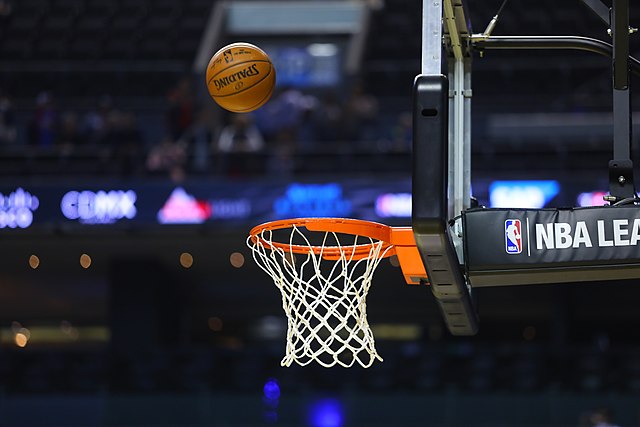The National Basketball Association (NBA) is predominantly black. As of 2023, Statista estimates that around 70.4% of the players are African American. However, this isn’t reflected across the ownership level. Black people have a hard time getting to these levels due to socioeconomic factors. That said, there have been black NBA team owners. Where are they now?
People Also Read: Brothers in the NBA: 6 Siblings Dazzling Fans on Court
Become an insider. Subscribe to our newsletter for more top trending stories like this!
Buy a quality basketball on Amazon.
Black NBA Team Owners
Black ownership in the NBA goes back to before the establishment of the NBA in its current form. When the sport was segregated, black and white teams existed separately but competed against one another in scheduled matches.
One of the earliest black NBA team owners was Robert L. “Bob” Douglas, referred to as ‘The Father of Black Professional Basketball.’ In 1908, he started the Spartan Field Club after he noticed the exploitation of black players by white owners. They took a bigger cut of the proceeds from the games they played against white teams.
The answer for Douglas wasn’t to dissolve black teams but to give the black community avenues of playing and using the money to support them. At this time, he was also an active player, so he started an adult team, the Spartan Brave. He played for them until 1918, when he began his managerial role.
People Also Read: 5 Famous African-American Soccer Players Representing the United States
Managing His Basketball Team
One of the first things Douglas did was find a place they could call home. As a result, he renamed the Spartan Braves to the Harlem Renaissance to access the Renaissance Ballroom & Casino. They played their first game in 1923.
The ‘Ren’, as they came to be known, were so good that they were invited to compete against white and black teams in the first iteration of the professional basketball league. They defeated a white team thought to be best at the time.
Join our Spotcovery Global Black Community Facebook Group for early access to exclusive content and to share in a lively discussion.
Dominance
Ren demonstrated time and again it was the best team. Additionally, the team’s impact infiltrated into the black culture, with some players entertaining crowds during concerts.
As the ‘Ren’ wanted to be recognized as the best black team in the country, it played against Oshkosh-All Stars from Wisconsin. This game was so popular that the two owners, Douglas and Lon Darling, agreed to extend the games and have a world series.
The white owners created the National Basketball League (NBL), which paved the way for the NBA. Even though there were black teams in the league, Douglas was the only black owner.
People Also Read: 5 Famous African-American Soccer Players Representing the United States
Collapse of Ren
White owners began to infiltrate the sport. They bought black players, making it difficult for the ‘Ren’ to remain competitive. Although the Washington Bears was founded by a black man, Hal Jackson, he received support from Abe Litchman and was able to lure some Ren players with higher pay.
World War II weakened the NBL, as some teams dropped out of the league. This forced the ‘Ren’ to join the NBL and was the only black-owned team in the league. However, the NBL ceased to exist. Most teams joined the newly formed NBA, and unfortunately, the ‘Ren’, a pioneering black-owned team, was left behind.
Become an insider. Subscribe to our newsletter for more top trending stories like this!
Get a pair of basketball shoes on Amazon.
White-Owned Teams
The NBA started as a segregated league until players like Nat “Sweetwater” Clifton, Earl Lloyd, and Chuck Cooper integrated into the league as its first African-American players. Despite that, black teams bled out talent to the white-owned teams, a move that ended their existence.
People Also Read: 6 Incredible Black Quarterbacks in the NFL
Robert Johnson Owns the Charlotte Hornets
After the demise of the Ren in the 1950s, it took years to have black NBA team owners. In the 2004/05 season, Robert Johnson became the first black majority team owner in the NBA after he bought the Charlotte Hornets for $300 million.
Unfortunately, he experienced a rocky period, failing to make a profit due to low attendance, little sponsorship, and a failure to establish a network that would attract advertisements and widen the revenue base.
People Also Read: Jonquel Jones: First Bahamian Basketballer Who Was Traded in the WNBA Draft
Selling to Michael Jordan
In 2010, Michael Jordan joined the list of black NBA team owners after he bought a majority stake in the Hornets for $275 million. Initially, he was a minority investor but rose to the top after Bob Johnson agreed to sell the team to him. This transaction was important for the representation of black owners in the league.
Selling the Hornets
For the last 13 years, MJ has shown that black people can impact the game. However, the former basketballer decided to sell his majority stake which means that currently, the NBA doesn’t have a black owner. Jordan sold his majority shares to Gabe Plotkin and Rick Schnall for reportedly $3 billion and will remain a minority owner.
Over the years, the league has had black minority stakeholders. Former NBA stars Grant Hill and Dwyane Wade have minority stakes in the Atlanta Hawks and Utah Jazz, respectively. That said, no one knows how much influence they have in the teams.
Buying a team is a tricky business and most who do it are billionaires. As of 2023, there are only nine African American billionaires, demonstrating the racial wealth gap and the difficulty of owning sports franchises. Only time will tell whether we’ll have another crop of black NBA team owners.
Nearly 80% of consumers visit directories with reviews to find a local business. List your business for free in our exclusive Spotcovery Black-Owned Business Directory.
Spotcovery offers unique and fresh daily content on Black culture, lifestyle, and experiences. We talk about everything black, black people, black-owned and black-owned businesses. We also deliver authentic and relevant content that will inform, inspire, and empower you! The future of black media is critical to today’s black experience! Our primary audience includes African Americans, Africans, Afro-Caribbean, and people of African heritage. Black culture is for the culture!
Become an insider. Subscribe to our newsletter for more top trending stories like this!





